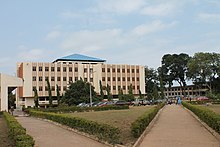
Back University of Cape Coast DAG University of Cape Coast German Universidad de Cape Coast Spanish Cape Coastin yliopisto Finnish Université de Cape Coast French University of Cape Coast GPE Jami'ar Cape Coast HA University of cape coast IG Universitas Capitis Corsi LA University of Cape Coast MOS
University of Cape Coast | |
 University Library | |
| Motto | Latin: Veritas Nobis Lumen[1] |
|---|---|
Motto in English | "Truth, Our Guide."[1] |
| Type | Public |
| Established | 1962 |
| Chairman | Prof. Obeng Mireku |
| Chancellor | Sam E. Jonah, ACSM, KBE |
| Vice-Chancellor | Johnson Nyarko Boampong |
| Undergraduates | Over 70,000 students national and internationally |
| Postgraduates | Over 10,000 |
| Location | , Central Region , 5°06′57″N 1°17′27″W / 5.115788°N 1.290810°W |
| Campus | Suburban area |
| Colours | Cosmic Cobalt, White, Aureolin and Vermilion |
| Nickname | Cape Vars |
| Affiliations | See below |
| Website | ucc |
| Ranked by Times Higher Education as the Best University in Ghana. | |
The University of Cape Coast (UCC) is a public collegiate university located in the historic town of Cape Coast in the central region of Ghana.[2] The campus has a rare seafront and sits on a hill overlooking the Atlantic Ocean. It operates on two campuses: the Southern Campus (Old Site) and the Northern Campus (New Site). Two of the most important historical sites in Ghana, Elmina and Cape Coast Castle, are a few kilometers away from its campus.
The University of Cape Coast was established in October 1962[3] as a university college in response to the country's dire need for highly qualified and skilled manpower in the education sector. Its original mandate was therefore to train graduate teachers for second cycle institutions, teacher training colleges and technical institutions,[4] a mission that the two existing public universities at the time were unequipped to fulfill.
On 1972,[5] the college attained the status of a full and independent university, with the authority to confer its own degrees, diplomas and certificates by an Act of Parliament. Today, with the expansion of some of its faculties/schools and the diversification of programmes, the university has the capacity to meet the manpower needs of other ministries and industries in the country, besides that of the Ministry of Education. The university has since added to its functions the training of doctors and health care professionals, business professionals, administrators, legal professionals, and agriculturalists such as agricultural extension agents. UCC graduates include Ministers of State, High Commissioners, CEOs, Members of Parliament, and Ghana's first female vice president.
- ^ a b "About UCC". Retrieved 7 July 2014.
- ^ "central region capital". Bing. Retrieved 16 September 2023.
- ^ "University of Cape Coast". Ghana web. Retrieved 12 August 2023.
- ^ "History". University of Cape Coast. Retrieved 12 August 2023.
- ^ Times Higher Education https://www.timeshighereducation.com/cms-academic/sites/default/files/migrated_institution_downloads/university_of_cape_coast_prospectus.pdf.
{{cite web}}: Missing or empty|title=(help)